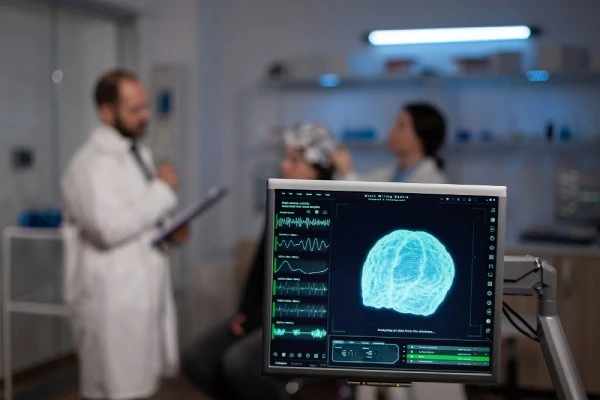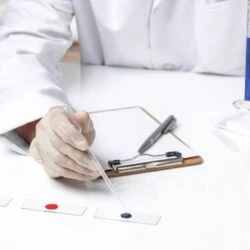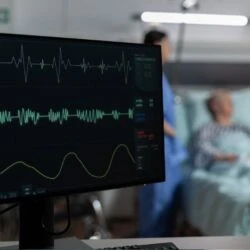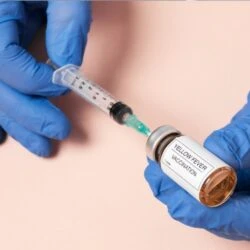
An electroencephalogram (EEG) test is used to diagnose epilepsy and check various seizures. EEG tests can also be beneficial to diagnose different health conditions like sleeping disorders, brain surgery, tumors, or paralysis. EEG can monitor your brain after a coma. It is a non-invasive test that works by picking the brain waves that are attached to the scalp. The article covers various aspects related to EEG; what is it? What are its benefits over another test, what are its limitations and considerations
What is an EEG test?
Electroencephalography (EEG) is a method to record the electrical activity of the brain. It uses metal discs called electrodes that are placed on the scalp. To record the electrical activity in the brain. Thus, it sends signals to a computer that records the results. The electrical impulses in an EEG look like waves or lines. These lines allow doctors access to abnormal patterns. The EEG may also be used to determine brain tumours, head injuries, and dementia. The EEG test helps doctors to assess blood flow in the brain. An EEG is used to confirm brain death in persistent coma. It helps find the right level of anaesthesia for someone in a medically induced coma.
What an EEG Test can Detect?
EEG can also help doctors evaluate many health conditions, including:
- Dementia
- Confusion
- Infections
- Sleep disorders
- Stroke
- Creutzfeldt-Jakob disease
- Brain Tumours
- Brain damage
- Sleeping disorders, etc.
- Alzheimer’s disease
- Drug overuse
- Infections like encephalitis
- Psychosis, a severe mental illness
EEG VS Other Scans
Electroencephalography (EEG) is a diagnostic test that measures the brain’s electrical activity. At Lifecare Center of Diagnosis, we offer cutting-edge technology for evaluating your brain conditions through the best neurological surgeons.
MRI and CT scans reveal structural details of your body, whereas EEG directly measures the brain’s functions. The electrodes used in an EEG test can detect fluctuations in the electrical charges from the firing of neurons in the brain, which is very helpful for developing brain wave patterns.
Benefits of EEG Compared to Other Tests
- EEG Helps us to diagnose seizure disorder and epilepsy. These abnormal discharges indicate epilepsy.
- EEG can also measure different sleep stages and thus treat different sleep disorders.
- EEG systems allow you to monitor long-term brain activity.
- EEG is affordable compared to other MRI/CT scans.
- EEG is very Useful for predicting brain function; You can detect your brain functions after any surgery
- It also helps to detect memory loss and tumors.
- EEG is a safe and secure process, unlike X-ray/CT scans.
- If we look at MRI and CT scans, they provide anatomical brain images and access functions through electrical signaling. Conversely, EEG detects neurological disorders and provides appropriate treatment.
What to Do Before and After the EEG Test? What's the Procedure?
The EEG test measures the electrical activity of the brain. The EEG’s first step is to paste small electrodes in your scalp. The technician will start recording the time after the electrodes are placed. It can usually take 2 hours. Here the complete procedure of the EEG test:
Preparing for an EEG Test
Here are some steps that you must consider while preparing yourself for an EEG test
- Do fasting or don’t eat and don’t drink eight hours before the test.
- You must complete your sleep of 6-7 hours before the test.
- Must eat plenty of fruits and vegetables at night before the test is performed
- Tell your doctor about your disease or allergies before the test is performed.
- For performing the test, you must ensure that no conditioner or styling products are in your hair. For a safe test, you can wash your hair.
During the EEG Test
- The technician lies you on a comfortable bed
- He tells you to close your eyes and take deep breaths.
- It can throw off the reading if you even blink or swallow.
- The technician will continue to test in breaks for your comfort
- The technicians will tell you to breathe deeply and quickly or open and close your eyes.
After the EEG Test
-
Once the EEG is finished:
- The technician will remove the electrodes on your scalp and wash the glue on your hair
- If you are having seizures after the test, then the doctor may tell you not to drive the day you performed the test
- After 3-4 hours of the EEG test, you can take the medications you stopped before the test is performed
- A neurologist will check your test reports and tell you what to do next.
Limitations and Considerations For EEG Test
-
Besides the incredible benefits of EEG, it has various limitations.
- EEG is most sensitive to synaptic potentials. Most important is its poor spatial resolution.
- EEG recordings do not directly capture axonal potential.
- The error while diagnosed with EEG can sometimes lead to misdiagnosis of the patient.
- EEG can be exposed to potential risks when detecting Seizure-related trauma like injuries, fractures, or falls.
- Sometimes, the video EEG may not provide a conclusive diagnosis.
Tips for Better EEG Results
-
To get better results, you might sleep for four to five hours before the test is performed. Next morning, you can go early for the tests.
You should wash your hair the night before the EEG test is performed and make sure your hair is oil-free. While performing the test, the electrodes will stick to your scalp if you have oil in your hair. While washing your hair, ensure you don’t use hair spray or conditioner, as these will affect the electrodes during the test.
Life Care Center has the best neurosurgeons with more than ten years of experience. They have performed a large number of complex brain and spinal cord surgeries. We are conducting various tests in our lab, such as ultrasound, sonography, MIR, EEG, and more.
Summary
-
To get better results, you might sleep for four to five hours before the test is performed. Next morning, you can go early for the tests.
You should wash your hair the night before the EEG test is performed and make sure your hair is oil-free. While performing the test, the electrodes will stick to your scalp if you have oil in your hair. While washing your hair, ensure you don’t use hair spray or conditioner, as these will affect the electrodes during the test.
Life Care Center has the best neurosurgeons with more than ten years of experience. They have performed a large number of complex brain and spinal cord surgeries. We are conducting various tests in our lab, such as ultrasound, sonography, MIR, EEG, and more.
Recent Blogs:

Double Marker Test

Understanding Shingles: Symptoms, Causes, and Prevention

XRAY at Home

2D Doppler echo Test

ECG Test

Everything you Need to Know About Dengue Blood Tests: Diagnosis, Prevention, and Treatment
Trustindex verifies that the original source of the review is Google. Helpful, Caring and very professional. Thank you for your service.Trustindex verifies that the original source of the review is Google. Excellent support from both Bhavika and Bhavini no word to say 👏👏Trustindex verifies that the original source of the review is Google. One of the best diagnostic Centre staff is very helpful and very kind with patient. Great service very professional.Trustindex verifies that the original source of the review is Google. Ms. Hasina was very efficient and courteousTrustindex verifies that the original source of the review is Google. Excellent service by technician Vinod Kumar Yadav.

